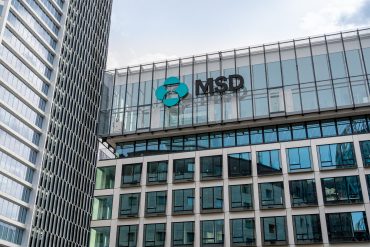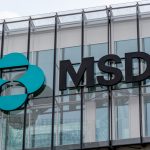
- Earnings Season
- Healthcare
- Pharmaceuticals
Merck Plans $3 Billion Cost Reduction to Fund Drug Development
6 minute read

Pharmaceutical giant Merck initiates workforce reductions and facility consolidation to strengthen drug development pipeline before Keytruda patent expires
Key Takeaways
- $3 billion cost reduction by 2027: Merck plans to eliminate administrative, sales, and R&D positions while consolidating real estate and manufacturing operations to generate $1.7 billion in annual savings.
- Full reinvestment in pipeline development: The pharmaceutical giant will channel all cost savings into new product launches and drug development rather than boosting margins, preparing for Keytruda’s patent expiration in 2028.
- Q2 revenue decline and guidance adjustment: Second-quarter revenue fell 2% to $15.81 billion, prompting Merck to narrow its 2025 sales outlook to $64.3-$65.3 billion while raising the lower end of earnings guidance to $8.87-$8.97 per share.
Introduction
Merck announces plans to slash $3 billion in costs by the end of 2027, a strategic move aimed at reinvesting in new product launches and their expanding drug pipeline. The pharmaceutical giant faces mounting pressure from weakening quarterly performance and the looming patent expiration of its blockbuster cancer drug Keytruda in 2028.
The restructuring initiative represents a fundamental shift in Merck’s operational strategy. Rather than pursuing cost cuts to boost short-term profitability, the company commits to reinvesting all savings into innovation and pipeline development to secure long-term growth.
Key Developments
The comprehensive restructuring plan targets multiple operational areas across Merck’s global footprint. The company will eliminate specific administrative, sales, and R&D positions while continuing strategic hiring in growth areas. Real estate consolidation and manufacturing network optimization form core components of the efficiency drive.
Merck expects to incur approximately $3 billion in pretax restructuring costs, with about 60% requiring cash outlays. These upfront investments will pressure near-term free cash flow but are projected to generate $1.7 billion in annual savings by 2027, representing roughly 3% of the company’s fiscal 2024 operating expenses.
The announcement follows disappointing second-quarter results that missed Wall Street expectations. According to CNBC, the company seeks to counteract expected revenue losses due to the Keytruda patent expiration in 2028 and the impacts of impending pharmaceutical tariffs under the Trump administration.
Market Impact
Merck shares declined approximately 3% in premarket trading following the restructuring announcement. The market reaction reflects investor concerns about execution risks and the substantial upfront costs required to achieve projected savings.
Second-quarter financial performance underscored operational challenges facing the company. Total revenue reached $15.81 billion, marking a 2% decline compared to the same period last year. Adjusted earnings per share stood at $2.13, down from $2.28 in the previous year, primarily reflecting higher R&D expenses and a $649 million restructuring charge.
The pharmaceutical segment generated $14.05 billion in revenue, with Keytruda contributing $7.96 billion despite 9% growth that fell short of StreetAccount estimates. Gardasil faced significant headwinds in China, where sales dropped 55% due to high inventory levels and weak demand, though U.S. sales rose modestly by 2%.
Strategic Insights
The cost reduction strategy aligns with broader pharmaceutical industry trends toward operational efficiency and portfolio optimization. Companies increasingly prioritize R&D effectiveness and digital transformation to accelerate drug development timelines while managing rising regulatory pressures.
Merck’s decision to reinvest savings rather than boost margins signals confidence in its pipeline prospects. This approach becomes critical as the company prepares for Keytruda’s patent cliff, which currently represents over half of pharmaceutical segment revenue. The reinvestment strategy aims to establish new growth drivers before losing exclusivity on its most important asset.
Newer products show promise in offsetting future Keytruda declines. Winrevair generated $336 million in Q2, exceeding analyst expectations and demonstrating the potential of Merck’s emerging portfolio. The company’s animal health division posted strong performance with $1.65 billion in sales, an 11% increase driven by livestock product demand and recent acquisitions.
Expert Opinions and Data
CEO Rob Davis emphasized the strategic rationale behind the restructuring, highlighting a shift toward new growth drivers and expressing confidence in navigating patent expiration challenges. The leadership team positions the initiative as essential preparation for the next phase of innovation-led expansion.
Industry analysis suggests the move reflects broader pharmaceutical sector dynamics. Approximately 85% of biopharma executives plan investments in digital technologies and artificial intelligence for R&D operations in 2025, according to recent industry surveys. This technological focus aims to improve development efficiency and reduce time-to-market for new therapies.
The restructuring timeline spans multiple years, allowing Merck to manage transition risks while maintaining operational continuity. Previous supply chain optimization initiatives demonstrate the company’s capability to execute large-scale efficiency programs, having reduced inventory by 30% and achieved $300 million in annual savings through prior operational improvements.
Conclusion
Merck’s $3 billion restructuring initiative represents a strategic response to industry pressures and patent cliff challenges. The company has narrowed its 2025 financial guidance, projecting sales between $64.3-$65.3 billion and raising the lower end of earnings expectations to $8.87-$8.97 per share.
The success of this operational transformation depends on effective execution of cost reduction targets and successful translation of savings into pipeline advancement. Merck’s commitment to full reinvestment in innovation positions the company for long-term growth while managing near-term financial pressures from restructuring costs and competitive market dynamics.








